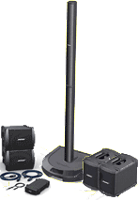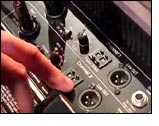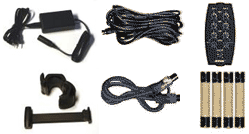L1® Unofficial Users' Guide
This is the Unofficial Users' Guide and FAQ (Frequently Asked Questions) for the Bose® L1 family of products. It is a collection of advice, hints and tips from system owners and people-at-Bose.
Many of the ideas here originated on the Bose® Pro Portable PA Community. [1]
If you just got your System or want to get to know it better, you are in the right place.
If you just got a gig and have found out the house system is a Bose® L1 system you probably want to read the L1® Unofficial Performers' Guide.
Contents
|
8 minute quick start Four short setup videos. These videos were created before the release of the L1 Model II and T1 ToneMatch Audio Engine. The principles are still applicable. These videos were provided for use here by Bose®. These originally appeared on the Bose website Video #3 was added later.
|
==Bose Official Frequently Asked Questions== |
The Gear
- A1 PackLite® power amplifier Model A1
- B1 Bass Module
- L1 Cylindrical Radiator® loudspeaker
- PS1 Power Stand (Classic) / Model I
- L1® Model I
- L1® Model II
- R1 Remote
- T1 ToneMatch® Audio Engine
ToneMatch®
What is the concept behind ToneMatch® presets, and what are the benefits?
ToneMatch® is a proprietary new technology from Bose that for the first time makes it possible for live musicians anywhere, anytime, to play with recording-studio tonal quality.
The Problem
Most musicians, performers, and entertainers go to enormous lengths to develop their own, unique sound, or tone.
But one of the biggest sources of frustration in finding and then keeping good tone comes from the need to use an instrument pickup or microphone, and a loudspeaker.
The problem is that they all sound different.
They all color the sound of the voice or instrument that’s being amplified.
When musicians hear this coloration, they have a choice: live with the tonal coloration, try to fix it, either themselves or probably better by trying to work with a good sound engineer, or try another microphone or pickup.
Exactly the same thing is true of loudspeakers.
They all sound different.
Again, when musicians hear these tonal changes, they can either live with them, try to fix them, or they can look for another loudspeaker that they like better.
Bose concluded that most musicians are either playing with undesirable tonal coloration from microphones, pickups, and speakers, or are spending a lot of their time and effort trying to fix it.
Using a Gifted Studio Engineer
Now, one way you could get rid of the tonal coloration would be to give each musician a good sound engineer, who could listen to the tonal changes and take the time necessary to make adjustments on the sophisticated equipment needed to do this kind of work.
With ToneMatch technology that work has already been done.
Building the Studio Engineer into the Equipment
Bose has been working with many musicians and have listened to a wide variety of instruments, microphones and pickups connected to the L1 system, and for each, has taken the time necessary to make the adjustments to the sophisticated equipment necessary to optimize the tone.
Then, they stored the settings inside the T1, ready to be recalled at the touch of a button by any musician, anywhere in the world.
ToneMatch Partners
In order to provide the largest library of ToneMatch® presets, Bose has been working with a growing number of manufacturers to develop these studio-quality settings for their microphones and instruments.
You can watch video interviews with people from those manufacturers talking about ToneMatch technology.
How the Loudspeaker Affects ToneMatch Performance
It should be stressed that the loudspeaker plays a crucial role in delivering this kind of tonal improvement.
The L1 system is unique because it delivers the improvement consistently across the stage and throughout the audience in a way no conventional speaker can.
How ToneMatch Works Together with zEQ
You might not want to change anything once you hear the improvement provided by a ToneMatch® preset.
But if you do, there’s another key new technology built into the T1 ToneMatch Audio Engine for doing just that.
It’s called zEQ.
First, you select you ToneMatch preset.
Then, you turn the rotary selector on the T1 to zEQ.
At this point, three controls on the T1 are automatically programmed to provide tonal enhancements for your voice or instrument.
If you’ve selected a preset for bass guitar, for example, the three controls are programmed to allow tonal enhancements for that particular instrument. If you choose a vocal mic, the controls are programmed for vocals, and so on.
It is the combination of the new tone-shaping technologies in the T1 engine, married to the exceptional coverage and high degree of portability in the new L1 model II system, that compels Bose to say that this is the most advanced system they’ve ever offered to musicians.
Related Resources
- A Personal Take on ToneMatch® Technology - presentation from Ken-at-Bose (video)
- ToneMatch® Presets for the T1 ToneMatch® Audio Engine
- What others are saying about ToneMatch® Interviews with ToneMatch® Partners
- zEQ
- Presets
- What happens when you bypass a ToneMatch® Preset?
Setting up
- Basic Setup - Classic / Model I
- Presets What they are, how to upgrade
- Gain Staging Tips from Owners and people-at-Bose
- Mixers / Mixing Desks Connection notes for several different makes and models
- Effects Connection notes for several different makes and models
- Setup 5 Minutes Hints from the stage
- Hearing Yourself with the L1™ Understanding your System
- Feedback Everyone wants to know about this
Accessories
- Bags - Standard
- Deluxe PS1/L1 carrying bag set
- Hardshell Cases
- Spare Parts
- see all on the Bose® Accessories Page
Carrying the Gear
Stage Layouts
Some illustrations that demonstrate principles
Musical Instruments and Their Use with the L1
- Acoustic Guitar
- Amp Modellers
- Drums / Other Percussion
- Electric Bass
- Keyboards Mono vs. Stereo
- Line6 patches at Vettaville (submitted by Chuck-at-Bose, CJ-at-Bose, SteveG-at-Bose and others]
- Bose L1 Studio Mode Bundle for PODxt (series) at Vettaville (bdotson submitted)
Operating
All
Model I / Classic
L1 Model II
T1 ToneMatch Audio Engine
L1 Compact
Terminology & Concepts
Troubleshooting
Working with Others
Acknowledgement
A great deal of this information has come from the
Unofficial User's Guide on the Bose® Musicians Community Message Boards (the Forum).
I have done some light editing mainly for formatting. Most footnotes lead to a link to the original Forum post.






